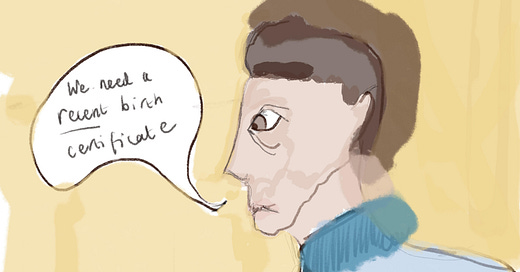Dear Friend,
I hope you had a good week. So far Springtime in Paris is being only semi-reliable, offering pockets of face-warming, heart-lifting sun, but also quite a lot of rain and grey, too. Nonetheless, I am enjoying the longer days and the blossom on the trees, as well as the tentative start of café-terrace season.
I have noticed recently and maybe you have too that a lot of my conversations at the moment turn to the recent advancements in artificial intelligence, especially the programmes created by OpenAI, that is:
ChatGPT, a super-smart virtual assistant/chatbot that gleans all its apparent knowledge from scraping the internet for text;
And Dall-E, which does something similar but with images. So you can enter any descriptive prompt, like ‘young man enjoys a bowl of Bran Flakes, rendered in the style of David Hockney’, and the programme will delve deep into the visual psyche of the Internet and a few moments later show you an impressive, sometimes slightly unnerving, version of what you asked for.
I have strong luddite tendencies, evidenced, perhaps, in the fact that I use technology to send a weekly correspondence as if from a pen friend. However, I am trying to be as open-minded as possible when it comes to the fast-developing AI capability, typified by the OpenAI products, but also being developed by the likes of Google and Elon Musk.
It is quite fun to play with image generation on Dall-E, which often yields funny, even Surrealsit-style results. Below is an image I generated when I typed: ‘A letter sent from someone in Paris’.
I like the absurdist, uncanny details that come to the surface when Dall-E scrapes the Internet’s underbelly. Here, hand-drawn red love-hearts frame a hand-written envelope that seems to read something like “I am 4 Paris, 1 palions’?.
Here are some young men eating Bran Flakes ‘rendered in the style of a David Hockney painting’.
But I’m being a bit facetious here, or rather I am showing only the most basic usage of the technology. The sophistication of the result depends on the skill and sophistication of the prompt, and for creative people who have learned how to talk to these image-rendering programmes, there is a high level of sophistication possible.
An example: former Paris resident, great friend and highly talented art director Jillian Hobbs has spent time learning how to successfully communicate what’s in her very creative mind’s eye with iterative AI tools (she often uses a programme called Midjourney). She brings together her dreamy creations on an Instagram account called Creative Principle, described by her as “Mystical, magical something from nothing.” I love what she creates.
Still, it does feel like we’re in a bit of a Wild West phase at the moment with rapidly developing AI. It is amazing that OpenAI’s programme’s can process almost the whole Internet, but they shouldn’t really be able to. It’s like it’s a school project and the teacher has said ‘go ahead and cut images out of magazines, copy lines of poetry etc etc.’, which is fine for a school project, but more complicated when you’re talking about a company that is slated to be valued at 29-billion dollars. My feeling is that it will inevitably eventually be regulated with putative fines, in the style of the EU’s General Data Protection Regulation (GDPR), which sets guardrails around Europeans’ right to consent to their data being used.
Now, when it comes to ChatGPT, or other highly powerful text-generating AI programmes, I am surely predisposed to be even more irked given that writing is how I make my living; they on my turf! For now, I don’t think the technology’s capabilities threaten my livelihood, in fact I think it can be quite a useful tool for quickly competing would-be time-consuming tasks like writing some HTML code, or asking for a summary of a longer text.
As the months and years go on, though, this technology will undoubtedly get better and better at producing and reproducing style, so maybe one day, I will be able to say ‘write a letter from Paris in the style of a journalist from the UK who speaks French, has a dog and likes the writing of MFK Fisher’, and the programme of the future will be able to write this very letter. But there is still the question of lived experience, and the essential desire to connect with another human’s experience…and I’m not sure how AI ever gets round this. In fact, some optimistic thinkers hope that AI will in fact allow us to double down on the connecty, human things that we do, and that human relationships will become more, not less, important. We’ll see.
But I have, thanks to a conversation with friends at dinner on Friday, found one limitation of the technology that is pretty much guaranteed and future-proofed…one thing that AI technology, however advanced it becomes, will NEVER be able to master, namely: FRENCH ADMINISTRATION!
AI technology runs on reliable data-sets and logical problem-solving. French administration runs on a seemingly ever-changing nexus of paperwork, the mood of the person administering the paperwork, and probably a lot of cigarettes.
A couple of real-life examples:
I once went to the tax office to get all my paperwork up-to-date. I had to back-declare zero income for some months when I wasn’t in the country. This, naturally, had to be done by hand and on paper. The woman working in the tax office informed me that they didn’t have any fresh forms, so I had to enter my back-declarations on some forms from 2013 (the year was 2017). She then got out a Tipp-Ex dispensing machine, those ones that look like a little mouse, and asked me to go through each of these paper forms and Tipp-Ex out the dates from 2013, so she could then write the dates from 2017 on each of them. I started doing as she asked. She shouted at me for not Tipp-Exing correctly.
Recently I moved house and paid La Poste (the post office) to place a redirect at my former address which, all being well, should send on mail to my new address. All did not being well. After a couple of months in the new address, which is number 16 (one-six), I had not yet received any redirected mail. So I went to the post office and asked them to have a look at their records. The man working there said “ah oui Madame, you are all set up in our system — number 61 (six-one)”. “No!”, I explained, it’s 16, please correct it on your system!”.
— “Oh mais Madame”, replied post-office man, “we cannot possibly change it on our SYSTEM. Redirects are managed by an entirely different team, you must call them”.
So I called them, the entirely different team, and I changed the address. which involved sending several more documents. Another month passes. Still no redirected mail. So I go back go the post office to speak to the same man.
— “Oh oui Madame, I can see that my colleagues have changed your address, like you asked, to 160 ”. (One-six-zero) (my street number is 16).
I am still building up the courage to call the entirely different team again. I have yet to receive any redirected mail.

These are just some top-line examples of the logic-defying capacity of the system. I have many more and if I collected all the similar experiences of other friends, we would have a compendium. And yet, even with such a compendium at hand, I am convinced that no AI programme would be able to find any salient or consistent logic that binds all the possible and various outcomes together. It simply defies logic, technology or progress — which is impressive, and somehow comforting, in a way.
Thirty-second book club
This week I have been reading a biography of legendary Belle Epoque French actress Sarah Bernhardt. The book has been on my shelf for a while and I was prompted to pick it up ahead of going to the opening of Sarah Bernhardt. Et la femme créa la star (woman created the star) at Le Petit Palais in central Paris. The story of her life is a sass-filled romp, charting her incredible rise from courtesan to global superstar. I knew she was a very famous actress, but thanks to the book and the exhibition, I also learned that she was an accomplished sculptor and painter (her studio at Place de Clichy is recreated in the expo), as well as a fiction and non-fiction writer, a producer and director, and fabulous creator of her own brand. She created a catch-phrase ‘quand même’, an incredibly French French phrase which means ‘all the same/regardless’, describing the star’s indefatigable attitude. She even had it embossed on to crockery. She loved gothic motifs like bats and famously had her own silk-lined coffin, which she used to rehearse her lines and also sometimes to sleep in. She was clearly a hoot, as well as a huge talent, and it’s well worth seeing the exhibition if you get the chance. It’s on until late August.
Thank you for reading this letter about, mostly, AI and French administration. Maybe one day in the not-so-distant future it will be held up as an artefact demonstrating the willing delusion of a writer to believe she could not be replaced by machines, but who was nonetheless spot-on about the awe-inspiring endurance of French administration.
If you like my letters, please do subscribe, sponsor, like, share, comment, as you see fit. Thank you very much to those who have chosen to sponsor Pen Friend. I will send out your thank-you notes this week!
Have a good week!
Yours,
Hannah








“…as well as the tentative start of café-terrace season.”
What a great description: café-terrace season. It recalls every romance movie ever made.
“…the programmes created by OpenAI”
A fantastic way to make a ordinary word, “programs,” extraordinary: “programmes.”
“But there is still the question of lived experience, and the essential desire to connect with another human’s experience…and I’m not sure how AI ever gets round this.”
Truth be told, AI will have the abilities to make “the essential desire to connect with another human’s experience” from the Human-Imperfect to the AI-Perfect. Just think, no more breakups, no more broken hearts (of course, in my experience, I pity the person who never had her/his heartbroken). https://youtu.be/CFJ0ijW--cY
“French administration runs on a seemingly ever-changing nexus of paperwork, the mood of the person administering the paperwork, and probably a lot of cigarettes.” With AI, there will be no “person” to inject the randomness of the individual into making a problem worse. AI will run the whole show; you won’t even need to submit a change of address; AI will just know it. https://youtu.be/ARJ8cAGm6JE
“The story of her life is a sass-filled romp, charting her incredible rise from courtesan to global superstar.”
Now, I don’t want to sound sexist, it is very likely that Sarah Bernhardt would be unknown to history if she’d been born with common features and stout; as men think women are like books, if the cover doesn't catch their eye they won't bother to read what's inside.”
“She created a catch-phrase ‘quand même’, an incredibly French French phrase which means ‘all the same/regardless’, describing the star’s indefatigable attitude.”
I may try to get a license plate that says, “quand même”
Ooof I am 10 months into the never-ending administrative “process” of becoming a resident in Italy, so I can very much relate to your French headaches! Bon chance!